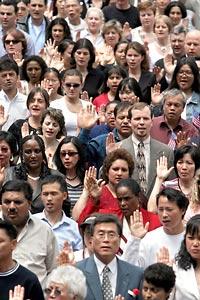Originally published September 20, 2006 at 12:00 AM | Page modified May 14, 2010 at 11:19 AM
Citizenship: Latinos less likely to naturalize
While debate swirls around the estimated 11 million largely Hispanic illegal immigrants in the United States, little attention is paid to...
Gannett News Service
WASHINGTON —
While debate swirls around the estimated 11 million largely Hispanic illegal immigrants in the United States, little attention is paid to the nearly equal number of foreign-born residents who are naturalized U.S. citizens.
These come mainly from Asia. A smaller percentage of Latinos go through the naturalization process. Forty-one percent of the 537,151 new Americans in 2004 — 218,974 — were from Asia, according to the federal Office of Immigration Statistics. While Mexico tops the list of home countries of new U.S. citizens that year, the next five are in Asia: India, Philippines, Vietnam, China and Korea. Those trends held true over the five years ending in 2004.
Compare that with the makeup of illegal immigrants in 2005. The Pew Hispanic Center says 56 percent were Mexican, 22 percent were from the rest of Latin America, and 13 percent were from Asia.
"The question isn't so much why it is that Asians naturalize at a higher rate," said Bill Ong Hing, professor of law and Asian-American studies at University of California, Davis. "It's why Latinos and Mexicans don't naturalize at higher rates."
Hing and others cite many reasons: Asians place more value on U.S. citizenship because of cultural differences; Hispanics have a harder time with the immigration system because many are less educated and come into the country illegally; the long distance from Asia drives a stronger desire to break ties with the home country, while the closeness of Mexico has the opposite effect.
These are the basic requirements for U.S. citizenship:
• 18 years old;
• a legally admitted permanent resident;
• five years in the United States;
• good moral character;
• agreement with the Constitution;
• proficiency in English;
• knowledge of government and U.S. history;
• Oath of Allegiance.
Source: Citizenship and Immigration Services
Like many new citizens, several intertwining reasons put Mohammed Ibrahim, an Iraqi Kurd, on the path to taking the oath of U.S. citizenship May 5 in Nashville, Tenn.
"One of them was when I applied for citizenship, there was no hope to go back to Iraq," Ibrahim, 57, said of his war-ravaged country. "The second thing is to be able to benefit [by] being [a] citizen of one of the greatest countries of the world."
With Saddam Hussein out of the picture, Ibrahim has another reason for seeking U.S. citizenship: Only Kurds who have become U.S. citizens are able to return and help with the reconstruction of Iraq.
Hing said he believes Asian culture drives more immigrants from that part of the world to become citizens.
"It became a tradition. It was a habit. It was something you did as an Asian immigrant," said Hing, who is Chinese American.
Mexicans, he said, can move between their home and the United States more easily, making them less likely to go through the naturalization process.
"It was no big deal for them coming back and forth," Hing said. "It was not part of their psyche to become naturalized."
Distance from home and the likelihood of returning there are factors driving which immigrants go on to become U.S. citizens, said Jeffrey Passel, senior research associate at the Pew Hispanic Center, which studies immigration.
The fact that many Mexicans come into the country illegally also makes it more difficult for them to go through the naturalization process, Passel said. A person must be a legal resident for five years before applying for citizenship.
David Lubell, state director for the Tennessee Immigrant and Refugee Rights Coalition, doesn't buy the cultural-difference argument.
"If there was an Asian country nearby [the United States], you'd have the same thing," Lubell said. He said he blames the immigration system and the fact that low-skilled workers have less access to visas, depriving them of legal status and the path toward citizenship.
Mabel Arroyo, a Nashville immigration attorney, said she finds learning English is often a barrier: "They don't know the language, and they don't have a lot of interest in learning the language."
Also, she said, some Mexicans have a gut aversion to becoming U.S. citizens because they think they would be renouncing their home country, what they call "piso la bandera," or "I step on my flag."
Whatever reticence Mexicans and other Hispanics may have about becoming U.S. citizens is likely to change, Hing and Passel said.
Anger flowing from immigration debates will lead more to seek citizenship, the two experts say, to pursue what the citizenship test calls an important freedom: the right to vote.
UPDATE - 10:01 AM
Rebels tighten hold on Libya oil port
UPDATE - 09:29 AM
Reality leads US to temper its tough talk on Libya
UPDATE - 09:38 AM
2 Ark. injection wells may be closed amid quakes
Armed guards save Dutch couple from Somali pirates
Navy to release lewd video investigation findings
More Nation & World headlines...
![]()

Entertainment | Top Video | World | Offbeat Video | Sci-Tech
general classifieds
Garage & estate salesFurniture & home furnishings
Electronics
just listed
More listings
POST A FREE LISTING



